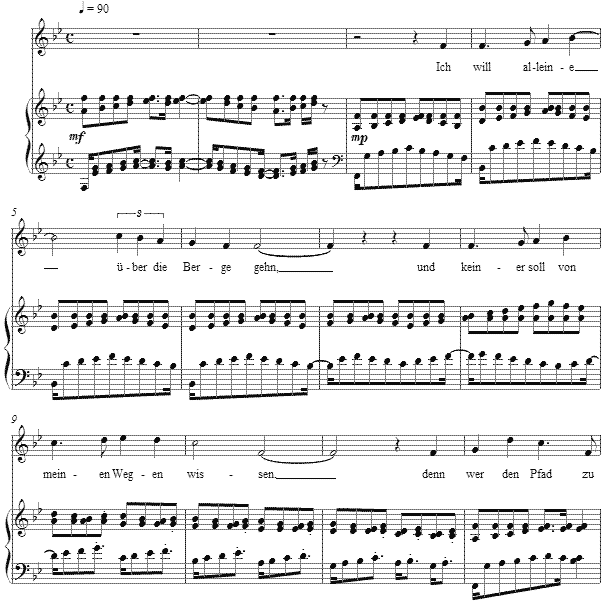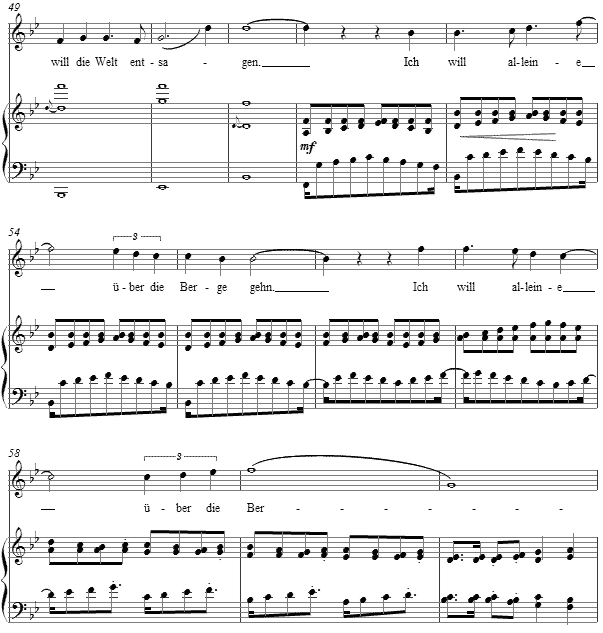Music and Texts of GARY BACHLUND
Vocal Music | Piano | Organ | Chamber Music | Orchestral | Articles and Commentary | Poems and Stories | Miscellany | FAQs
Ich will alleine über die Berge gehn - (2009)
Erich Kurt Mühsam
for medium voice and piano
Ich will alleine über die Berge gehn,
und keiner soll von meinen Wegen wissen;
denn wer den Pfad zu meinen Höhn gesehn,
hat mich von meinen Höhn herabgerissen.
Ich will alleine über die Berge gehn,
mein Lied soll ungehört am Fels verklingen,
und meine Klage soll im Wind verwehn; -
nur wer dem eignen Herzen singt, kann singen; -
nur wer dem eigenen Herzen klagt, kann klagen;
nur wer das eigne Herz erkennt, kann sehn. -
Hinauf zu mir! Ich will der Welt entsagen,
und will alleine über die Berge gehn.[ 4 pages, circa 2' 50" ]
Erich Kurt Mühsam, in a 1915 sketch by Pfeil
I will go alone over the mountain,
And none shall know my way;
Because who would see my pathway to the heights
Would tear me away from that path.
I will go alone over the mountain,
My song will sound unheard among the rock,
And my complaint will be lost in the wind; -
Only the one who sings with his own heart, shall sing; -
Only the one who sorrows with his own heart, shall sorrow;
Only the one who knows with his own heart, shall see. -
It is up to me! I shall renounce the world,
And will go alone over the mountain.
gb
The text comes from Mühsam's collection, Der Krater (1909) "The Crater." One plainly sees the intent of the poet is towards that sort of individualism in which others become a threat to said individual dreams and aspirations.
In a much later publication, Mühsam becomes more disciplined in his expression of a kind of socially responsible individualism. In his 1933 tract, The Liberation of Society from the State, What is Communist Anarchism? (Die Befreiung der Gesellschaft vom Staat, Was ist Kommunistischer Anarchismus?) he jumbles socialist terms in an interesting statement wholly in support of individualism, as he writes, "Anarchism is the teaching of freedom as the foundation of human society. Anarchy thereby denotes the condition of social order aspired to by the anarchists, namely the freedom of each individual through the general freedom." [ 1 ]
He makes a clear distinction between what he terms "libertarian socialists" whose aim is freedom from the state and "centralist socialists" whose aim is power to the state. It is against the later which he stands, at a time when the National Socialist Party came to power in Germany, and by which Mühsam, a Jew, was arrested and killed a year later by the SS in the Oranienburg prison camp. As a freedom oriented anarchist who employed the rhetoric of socialism to speak against "central socialism," he was a speedy victim of these "central socialists." His tract, while confused in political terminology for he was a socialist killed by socialists, speaks with today's distance for freedom first and foremost. This made him an enormous threat to the "central socialist." I imagine he would have fared no better under the state socialism of Stalin, Mao, Pol Pot or other statists who employ the utopian vision of a social society to build its polar opposite on the false foundations of promise and change.
The poem touched me as a positive statement of individualism, agitated with the need to "go alone over the mountain," while fully comprehending that others would deny this push towards individuality. It is an affirmation of "going it alone." For this, the setting is in an unabashedly diatonic major, the onrushing sixteenth rhythm as shared between the upper and lower voices of the accompaniment as motor, each phrase an arch. The vocal line begins in the mid range, with subsequent repetitions of the phrase rising passionately to the highest tessitura.
The statement that one must renounce the world is made in subdued dynamics but with intensity over simple whole note chords, before energetic restatements of this credo towards individualism. The setting ends without ritardando, rushing into the speaker's future moment without pause.
The score for Ich will alleine über die Berge gehn is available as a free PDF download, though any major commercial performance or recording of the work is prohibited without prior arrangement with the composer. Click on the graphic below for this piano-vocal score.
Ich will alleine über die Berge gehn
NOTES
[ 1 ] Mühsam continues, "Whoever asserts the freedom of the individual person in
demanding the community of all people, and conversely whoever equates the freedom of society with the freedom of all those who are communally bound within it, has the right to call himself an anarchist. Whoever, on the other hand, believes it acceptable to place people for the sake of the social order, or society for the sake of the presumed freedom of people, under external compulsion, has no right to be considered an anarchist."
As seen by a Nazi poster from the same era in which Mühsam was writing, "National Socialism will organize the intentions of the nation" was plainly and openly politicized, and yet the "will" of the nation was such that it murderously opposed the "will" of an artist such as Erich Mühsam, one among many.
In light of modern American politics, I find it sadly amusing that so many supposed compassionate conservatives and political liberals -- calling them progressives -- actually fulfill Mühsam's definition of those who would "place people for the sake of the social order.... under external compulsion" as so many government programs today betray.
The largest of these is deficit spending, in which borrowing from tomorrow to pay for today's supposedly human services places an "external compulsion" on future taxpayers. Both major American political parties, Republicans and Democrats, have contributed to this foolishness, it must be observed, and some minor parties have also espoused it.
Many of Europe's nostalgic socialist parties continue the dream of utopian socialism in spite of the destructive history of socialism in Europe. This seemingly soft "central socialism" which "organizes" is in fact the antithesis of Mühsam's dream which comes to individualism within society and, of course, freedom.
By this Mühsam and I both mean freedom from central government, for freedom is the opposite of governance. The proof comes in his own tract's title -- The Liberation of Society from the State.
As to art and its relationship to the coercive state, not only were artists such as Mühsam victims of its murderous viciousness, but humorists like G. K. Chesterton ably parodied the predictable trajectory of state coercion in his The Horrible History of Jones, Mark Twain opined much the same with his The Tyranny of Party, and an American icon, Walt Whitman, urged resistance in his To the States. Ambrose Bierce's Freedom reminds us of freedom, that "She screams whenever monarchs meet, / And parliaments as well," and the quintessential American president, Abraham Lincoln, noted the incompatible difference between liberty and tyranny in We all declare for liberty.
From so many quarters it is food for thought for the thoughtful, and poison to the statist whatever his political moniker.


